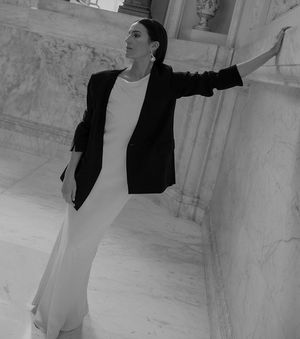

A Beginner’s Guide To Reiki
What is Reiki?
"Reiki is a practice rooted in the healing of life force energy," says Rana Askoul, a reiki practitioner and energy healer. "In Japanese, ‘reiki’ translates to ‘spiritual energy’ or ‘life-force energy,’ with ‘rei’ meaning spirit or soul and ‘ki’ meaning energy." This energy, believed to flow through all living things, is the foundation of the practice. Maria Amiouni, who also practices reiki, adds that it "works on the belief that when energy is in balance, you feel aligned, energetic and healthy. When it’s out of balance, this can lead to blockages which reiki works to unlock and release."
While reiki's modern form was developed in Japan in the early 20th century by Mikao Usui, it draws upon ancient traditions across different cultures, including the Arab world. "In our heritage, we’ve always respected the invisible energies within and around us. Practices like the use of herbs, oils and sacred rituals align with this idea of life-force energy," explains Rana.
How Does Reiki Work?
At its core, reiki is the belief that energy flows through every aspect of our being. During a session, a practitioner channels this energy through their hands. "You will be asked to lay down fully clothed on a massage table and the practitioner will move their hands on or just above the body," explains Maria. This process is designed to remove blockages and allow the energy to flow freely.
For those new to the practice, the experience is subtle but deeply transformative. "Many clients experience warmth, tingling or a deep sense of relaxation," says Maria. "Some may even feel emotional releases or vivid imagery." Rana echoes this, noting that reiki feels "like a current of warmth or light passing through the body, reaching spaces where energy feels blocked."
The Benefits of Reiki
Reiki has a wide range of benefits, addressing both physical and emotional challenges. "Reiki can ease muscle tension or fatigue, but it also works to soothe anxiety, grief or a sense of disconnection," says Rana. "It mirrors the way our traditional remedies support both body and spirit, offering a holistic approach to healing."
Maria agrees: "Whether it’s healing physical pain, emotional wounds or helping you rewire certain limiting beliefs, reiki works on all levels." After a session, many people feel a profound sense of peace... "A weight lifted off their shoulders is a common way clients describe it," Maria notes.
Who Should Try Reiki?
Reiki is suitable for anyone, regardless of age, background or belief system. "It’s a gentle practice that doesn’t require any particular belief," says Rana. "It’s about being open to the experience." According to Maria, she's worked with people across all ages and backgrounds, even those who were initially sceptical. "My own father, who was once dubious, now asks for sessions to relieve headaches."
For those dealing with stress, emotional imbalances or recovering from illness, reiki can offer much-needed relief. "Reiki meets you wherever you are, supporting what you need in that moment," says Rana. “It’s also a practice that respects each individual’s path, offering healing in its own time and pace.”
Incorporating Reiki Into Your Routine
While a monthly session can be enough for some, more frequent sessions might be needed if you’re navigating a challenging period. "If you’re working through something specific, like recovering from a difficult emotional period, a session every two weeks might be beneficial," says Rana.
Maria believes consistency is key to unlocking reiki’s full potential: "To see changes, it’s good to have sessions at least twice a month for a few months. After that, you can decrease the frequency." Whether you include reiki as part of your broader wellness routine or try it alongside other holistic therapies, it can offer a unique and effective way to maintain balance in your life.
What to Expect After a Session
After a session, many clients report feeling lighter, more peaceful and emotionally clear. "Some leave feeling energised, others deeply relaxed, but most feel an overall sense of balance," says Rana. Maria adds, "Crying is not uncommon during or after a session – it’s a sign that something has been released."
While the effects may continue to unfold in the days that follow, it’s important to stay open to the process. "Reiki’s effects ripple out gently over time," says Rana.
The Science Behind Reiki
While reiki has its roots in spirituality, some studies suggest it has practical health benefits. "Reiki can reduce stress and promote relaxation," Maria notes. However, both Maria and Rana agree that the scientific evidence for reiki remains mixed. "Like many energy-based practices, reiki sits between science and spirituality," says Rana.
For those sceptical about energy healing, the key is to remain open to the experience. "In our culture, not everything of value can be seen or measured. Some things, like love or spirit, are felt deeply without proof," adds Rana.
A Holistic Approach to Wellbeing
Ultimately, reiki is more than just a physical therapy – it’s a holistic approach to wellness. "Reiki works on the body, mind and spirit," says Maria. "It promotes relaxation and reduces stress, helping with pain management and enhancing the body’s natural healing processes." On an emotional level, it can clear mental clutter and promote emotional balance. Spiritually, reiki helps foster a deeper connection with yourself, promoting peace and self-awareness.
For anyone looking to find balance in today’s hectic world, reiki offers a gentle yet profound path toward healing. Whether you’re new to energy healing or looking to deepen your self-care routine, this ancient practice could be the key to unlocking a more harmonious you.
Follow @MARIA.AMIOUNI & @RANAASKOUL
Plus, here are the products they swear by for everyday wellbeing…








DISCLAIMER: We endeavour to always credit the correct original source of every image we use. If you think a credit may be incorrect, please contact us at [email protected].

